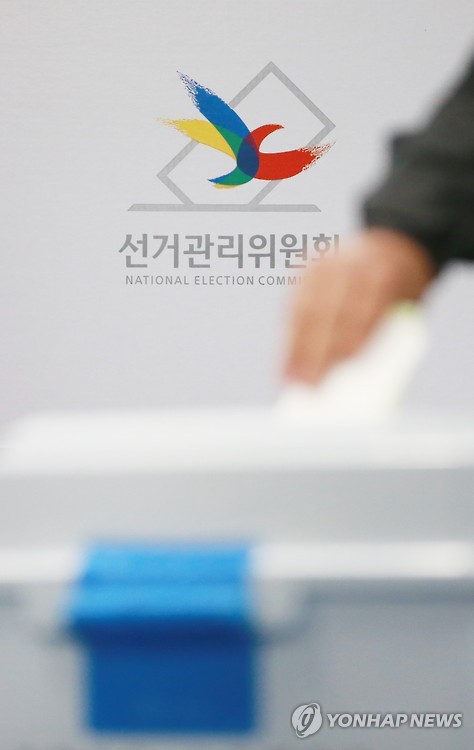- California Assembly OKs highest minimum wage in nation
- S. Korea unveils first graphic cigarette warnings
- US joins with South Korea, Japan in bid to deter North Korea
- LPGA golfer Chun In-gee finally back in action
- S. Korea won’t be top seed in final World Cup qualification round
- US men’s soccer misses 2nd straight Olympics
- US back on track in qualifying with 4-0 win over Guatemala
- High-intensity workout injuries spawn cottage industry
- CDC expands range of Zika mosquitoes into parts of Northeast
- Who knew? ‘The Walking Dead’ is helping families connect
Ruling party fails to win parliamentary majority
SEOUL, April 14 (Yonhap) — South Korea’s ruling Saenuri Party was projected to lose a parliamentary majority in Wednesday’s general elections in a resounding defeat that underscored public discontent with factional inflighting laid bare in its candidate nomination process.
The party was forecast to win only 124 out of 300 seats up for grabs, with more than 85 percent of the votes counted on early Thursday, according to the watchdog National Election Commission. It would mark the first time in 16 years that a ruling party has failed to win a parliamentary majority.
Ahn Hyoung-hwan, a spokesman of the ruling party’s election task force, said that his party is to blame for the poor showing, noting the party failed to live up to people’s expectations.
“We humbly accept the election results,” Ahn told reporters. “We will be reborn as the political party that will communicate with people and win their trust.”
More than 85 percent of the votes were counted as of 1:20 a.m., according to the National Election Commission.
The polls are crucial in South Korean politics as they will shape the legislative landscape for the next four years and gauge public sentiment ahead of next year’s presidential race.
South Koreans will go to the polls in December 2017 to elect a new leader, who will succeed President Park Geun-hye. Park’s single five-year term ends in early 2018. By law, she cannot seek re-election.
The ruling party’s poor performance is expected to deal a blow to Park’s efforts to push ahead with a series of reform bills.
Park has so far faced an uphill battle in passing a set of bills through the National Assembly because of the National Assembly Advancement Law. This law stipulates that a bill with contested issues can only be put up for a vote with the approval of more than 60 percent of sitting lawmakers.
Meanwhile, the main opposition Minjoo Party could secure 121 seats and the People’s Party is poised to win 39 seats while the minor opposition Justice Party is projected to win five seats and independents could win 11 seats, according to the election watchdog.
The People’s Party emerged as a clear winner in the elections. The People’s Party — which currently has 20 seats in the outgoing legislature — prevailed in 23 out of 28 contested districts in the country’s southwestern region, a key political stronghold of the Minjoo Party and its predecessors.
The People’s Party broke away from the New Politics Alliance for Democracy, which later changed its name to the Minjoo Party ahead of the elections in an apparent move to improve its image. In South Korea, changing a party’s name is a common vote-buying tactic, although its members rarely change.
The strong showing of the People’s Party could give a boost to its co-chairman Ahn Cheol-soo’s potential bid for the presidential race.
Ahn, the founder of South Korea’s largest anti-virus software firm, AhnLab, had a strong following, especially among young Koreans due largely to his clean and upright image when he entered the 2012 presidential campaign. He later dropped out.
Wednesday’s elections came amid tensions on the Korean Peninsula following North Korea’s nuclear test and long-range rocket launch earlier this year.
There has been speculation that North Korea may carry out a fifth nuclear test or launch a long-range missile to mark the birthday of the country’s founder Kim Il-sung on Friday. Kim, who died in 1994, is the grandfather of current leader Kim Jong-un.
Currently, the ruling party has 146 seats, while the Minjoo Party and the People’s Party have 102 and 20 seats in the 292-member legislature, respectively. Seven other seats are held by three other minor parties while 17 seats are independents.
The total number of parliamentary seats was 300 in 2012, but it has since dropped to 292 as some of them later lost their seats.












![그룹 방탄소년단(BTS) [BTS 공식 트위터. 재판매 및 DB 금지]](http://www.koreatimesus.com/wp-content/uploads/2025/07/Untitled-5-copy-199x223.jpg)





dealing with losing
April 15, 2016 at 8:20 AM
IH8MUD Forum